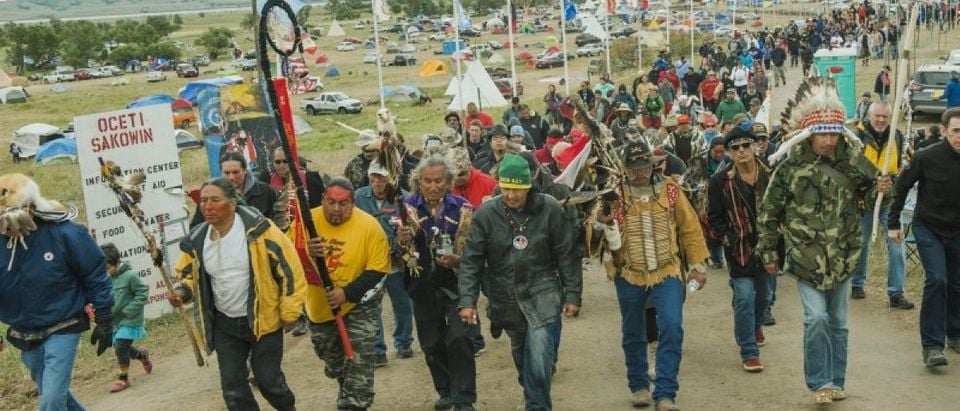A federal appeals court judge suggested Wednesday that the Dakota oil pipeline is being forced on the Native American tribe opposing the project.
A three-judge panel pressed lawyers defending the Dakota Access Pipeline with sharp questions on why they think the nearly 1,200-mile long project should continue before the government can review the project to ease concerns brought up by the Standing Rock Sioux.
The nearly $4 billion project has come under withering scrutiny by protesters and members of the Standing Rock Sioux, which both argue the pipeline’s construction would trample on tribal lands and destroy artifacts.
The tribe also believes it could potentially poison waterways, including rivers such as the Missouri River and Lake Oahe.
The DC Circuit of the U.S. Court of Appeals temporarily stopped the so-called DAPL on Sept. 17 within 20 miles of Lake Oahe in North Dakota while the court considers whether to order a longer delay. The pipeline was supposed to run at least 90 feet below the river.
The multi-state pipeline is a joint venture between energy companies Marathon Petroleum Corp. and Enbridge Energy Partners LP, and Energy Transfer Partners. More than 60 percent of the pipeline is complete.
“It looks like you’re forcing their hand,” Judge Thomas Griffith said about the company’s argument that the tribe had already been consulted about the pipeline’s route.
Miguel Estrada, a lawyer representing the companies, said the company was led to believe permission was a formality. “It’s not a formality now, is it?” Griffith said in response.
The Obama administration announced Sept. 9 that construction on the pipeline would be shelved until the government can determine the effects it will have on the environment.
The decision to temporarily halt the project’s construction was made in response to an earlier district court’s decision to deny motion for a preliminary injunction to the predecessors of the Great Sioux Nation, arguing that the Native American tribe could not show how the pipeline would damage the group’s sacred ground.
Activists and tribes members fought with the oil pipeline developers over whether the National Historic Preservation Act (NHPA) could prevent construction of the pipeline. The NHPA, among other things, allows the government to preserve historical and archaeological sites.
Dave Archambault II, chairman of the Standing Rock Sioux Tribe, said after oral arguments that the pipeline “threatens the lives” of more than 17 million people who rely on the Missouri River for their drinking water.
“This pipeline has already destroyed the burial places of our Lakota and Dakota ancestors,” he added. “If construction continues, our people stand to lose even more of our sacred places and cultural objects.”
Seven North Dakota archaeologists inspected on Sept. 27 the 1.3-mile section along the route of the Dakota Access pipeline in southern North Dakota and found only a handful of animal teeth and bone fragments.
Follow Chris on Facebook and Twitter
All content created by the Daily Caller News Foundation, an independent and nonpartisan newswire service, is available without charge to any legitimate news publisher that can provide a large audience. All republished articles must include our logo, our reporter’s byline and their DCNF affiliation. For any questions about our guidelines or partnering with us, please contact licensing@dailycallernewsfoundation.org.


